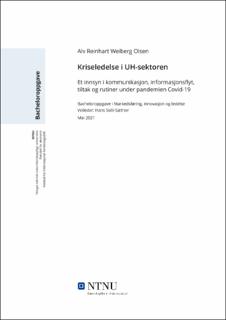Kriseledelse i UH-sektoren
Bachelor thesis
Permanent lenke
https://hdl.handle.net/11250/2776912Utgivelsesdato
2021Metadata
Vis full innførselSamlinger
Sammendrag
Oppgaven finner ved bruk av kvalitative intervjuer ut at endringene og rutinene ledelsen av institusjonen innførte som tiltak på pandemien, opplevdes i all hovedsak som gode og rasjonelle. Det kommer frem en god underliggende tillit til ledelsen, noe som bekreftes av flere. Samtidig opplevde ansatte og studenter til tider store utfordringer, da store deler av hverdagen ble snudd på hodet. Usikkerheten rundt omlegging til digital undervisning og eksamener, og varighet ble svært aktuelt, noe som tok tid å tilpasse seg for samtlige involverte.
Informasjonsflyt og kommunikasjon ble påvirket av omleggingen til mer bruk av digitale verktøy, noe som i flere tilfeller skapte utfordringer. Digitale møter ble den nye standarden, og gamle vaner som gangprat og andre lavterskel metoder for enkel kommunikasjon bortfalt over natten. Samtidig opplevdes omleggingen i flere tilfeller som mer effektiv, og til tider bedre enn gamle løsninger. Respondentene som ble intervjuet i sammenheng med oppgaven gir her gode svar, som reflekterer holdninger og opplevelser gjennom en uvanlig og utfordrende periode. Using qualitative interviews, the thesis finds that the changes and routines introduced by the management of the institution as measures for the pandemic were generally perceived as good and rational. There is a good underlying trust in the management, which is confirmed by several. At the same time, employees and students at times experienced great challenges, as significant parts of everyday life were turned upside down. The uncertainty surrounding the transition to digital teaching and exams, and duration became very relevant, which took time to adapt to for everyone involved.
Information flow and communication were affected by the shift to more use of digital tools, which in several cases created challenges. Digital meetings became the new standard, and old habits such as chatter and other low-threshold methods of communication disappeared overnight. At the same time, the restructuring is perceived in several cases as more efficient, and sometimes better than old solutions. The respondents who were interviewed in connection with the thesis give good answers here, which reflect attitudes and experiences through an unusual and challenging period.
